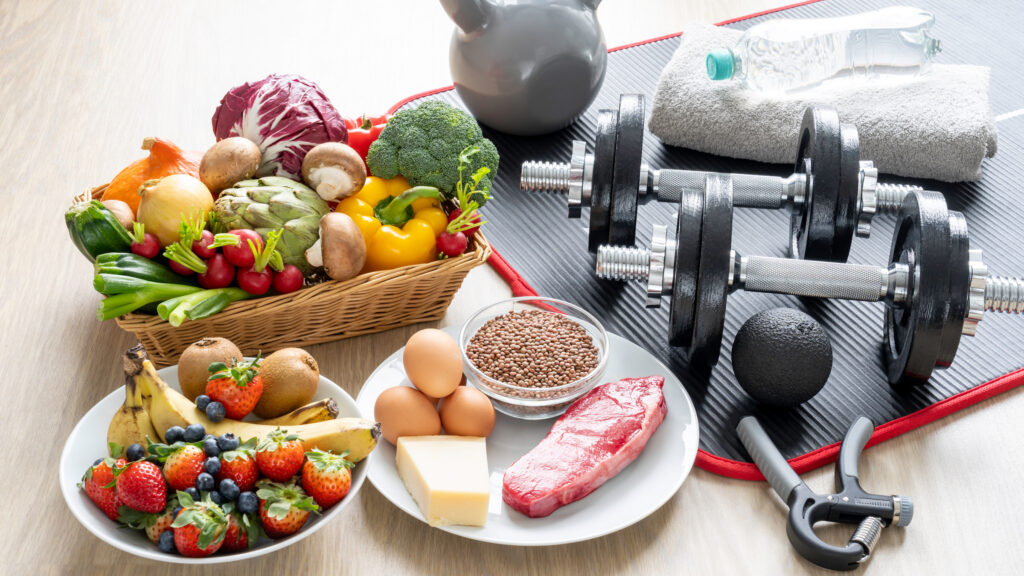Nutrition plays a vital part in improving the performance of your workout, directly impacting levels of energy, endurance and recovery. A balanced diet can greatly increase the effectiveness and efficiency of your exercise routine.
This article explores key aspects of nutrition for athletes, which includes what you should eat prior to or during and after exercise, as well as the importance of drinking enough water. It also helps you with making your diet more suited to meet your fitness goals in order to avoid the most common mistakes in nutrition.
Consider The Basics Of Sports Nutrition
The term “sports nutrition” refers to the planning and strategic management of a diet that improves athletic performance. It is about eating the correct types and quantities of beverages and food at the appropriate time to help fuel physical activity. This is crucial for all athletes since it directly impacts the endurance, energy level and recovery.
Balance of macronutrients is crucial in the field of sports nutrition. Carbohydrates are a primary source of energy, particularly during high-intensity sports, and proteins are essential to repair and grow muscles. Fats, often under-appreciated offer long-term energy and help support the function of cells. Knowing how to manage these macronutrients could dramatically enhance the performance of your cells.
Hydration is also crucial because even mild dehydration could affect cognitive performance and performance. Athletes must drink plenty of water prior to or during and after training. For quick and convenient nutrition, meal replacement shakes can be effective in ensuring an adequate intake of nutrients during busy days, or for recovery after a workout.
Pre-Workout Nutrition
Foods for pre-workouts fuel your body for maximum performance during workouts. Incorporating the right diet in the appropriate time increases the energy level of your body, increases your endurance and also prepares your muscles for physical effort. The right pre-workout food selection can make a big impact on the way you perform and feel during your exercise.
To boost your energy levels, consume the right balance of proteins and carbohydrates 30 to 60 mins prior to training. Carbohydrates are a great source of energy that is quick while proteins help build muscular strength and stop muscle breakdown. The best options are oatmeal with fruit, a banana and peanut butter or a smoothie containing Whey protein. These options provide long-lasting energy and help maintain muscle function.
Nutrition During Workouts

The ability to stay hydrated during training is crucial for maximum performance and overall well-being. Regular fluid intake helps to prevent dehydration that can result in a decline in endurance, a rise in fatigue and impaired judgement. It is a good idea to drink plenty of water prior to when you start feeling thirsty, especially during intense or long exercise sessions. Electrolytes, like potassium, sodium and magnesium are essential to ensure hydration and proper muscle functioning. They regulate nerve signals as well as muscle contractions, which are essential to efficiency. When you’re working out over a long period, look into drinks that provide electrolytes. Energy sources that are quick and easy to access, such as fruit or energy gels could be helpful during long workouts that provide immediate glucose for long-term energy without overloading the digestive system.
Post-Workout Nutrition
Recovery nutrition is an essential element of any fitness program that aids in the repair of muscles and replenishing energy reserves depleted in training. Consuming the right nutrition after exercising can lessen muscle soreness, accelerate recovery, and boost the overall performance. It is crucial to replenish your energy between 45 minutes and an hour after exercise, since this time period is ideal to absorb nutrients. A proper post-workout meal or snack must contain the combination of proteins and carbohydrates with a proportion of approximately 3:1. This helps to replenish glycogen levels and strengthen muscles. The most effective options are a protein shake containing the banana, Greek yogurt with granola and berries, or an entree of chicken and vegetables using brown rice. These meals will provide the nutrition balance to aid in recovery and help prepare your body for your next exercise.
Tailoring Your Diet To Specific Fitness Goals
Making sure your diet is in line with your fitness goals is essential in achieving the results you want. To reduce weight, focus on a deficit in calories while making sure you get that you get a healthy diet of nutrients. Foods high in fiber, protein and protein will help you feel more full for a longer period of time. However, gaining muscle mass requires a higher calorie intake and an increased intake of protein to aid in the growth and repair of muscles. Lean dairy, meats and legumes, in conjunction with exercises for strength, can aid in gaining the muscle mass.
Endurance athletes, like cyclists or runners, require carbohydrate-rich diets to sustain their energy. Complex carbohydrates like whole grains as well as starchy vegetables are crucial. Weightlifters, as well as strength athletes should prioritise protein to repair muscle and healthy fats to maintain joints and for energy.
For those who have dietary restrictions or preferences, for example gluten-free, vegan or ketogenic diets it’s essential to locate alternatives to the essential nutrients. For instance, vegans can depend on plant-based protein sources, as those on ketogenic diets must focus on fat-rich and low-carb meals.
Top Nutritional Habits to Steer Clear Of

To get the most out of your workout routine requires more than only what you eat but also the things you stay clear of. Certain dietary mistakes can impede your performance and hinder your progress.
Under-Fueling Your Body
Consuming insufficient nutrients or calories could cause a decline in energy levels as well as poor recovery and even loss of muscle. It is essential to provide your body with enough fuel to meet the energy requirements of your exercise routine and for recovery.
Over-Reliance On Supplements
While supplements are useful, they should not be used to replace food items. Whole foods provide a diverse array of nutrients as well as dietary fibers, which are essential to health. Supplements by themselves cannot offer.
Consuming Processed And Sugary Foods
They can cause high and low energy levels and negatively impact your performance during workouts and overall health. Foods with a high amount of sugars added to foods and unhealthy fats can cause chronic health problems.
Top Nutritional Habits to Steer Clear Of
Unconformity in eating habits can affect your body’s energy levels and impacting your workout performance and recovery. A balanced diet that is regular and consistent helps to ensure a steady supply of energy and aid in the repair of muscles.
To avoid these mistakes is as simple as following a carefully-planned nutritional plan. By focusing on healthy whole foods, as well as maintaining your diet in a healthy way will help you better prepare to achieve your fitness objectives.
Conclusion
Optimizing your diet is a constant process which improves both your performance in the gym and your overall wellbeing. It requires attention-to-detail as well as the ability to adapt and an knowledge of your body’s specific requirements. Take this journey with a sense of excitement and watch your fitness and health rise to new highs.

